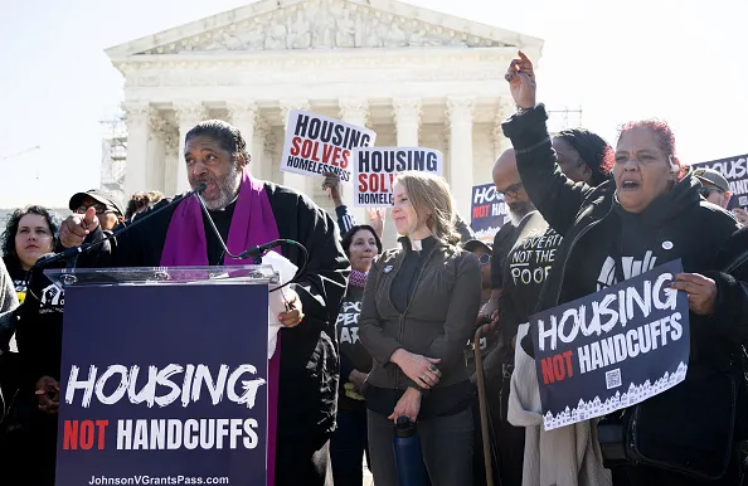
by Rev. Dorothy S. Boulware
There are over 140 million poor and low-income people in the U.S. In most cases, in the richest nation on Earth, their lives are defined by what they don’t have — healthcare, food, housing, a job that pays a living wage.
The Right Rev. William Barber, an anti-poverty activist and community organizer, will try to change that narrative this weekend by reminding politicians what poor people do have: the power to vote.
On Saturday, Barber, the founding director of the Center for Public Theology at Yale Divinity School, will convene the Mass Poor People’s and Low-Wage Workers’ Assembly and Moral March on Washington D.C. and to the Polls, a gathering on the National Mall designed to flex the political muscle of low-income Americans.
Though it echoes a similar rally Martin Luther King Jr. held some six decades earlier, the Mass Poor People’s March march will “launch a season of continued outreach to 15 million poor and low wage infrequent voters ahead of the 2024 U.S. elections and beyond,” Barber said in a statement.
“We will be demanding that both political parties heed the needs of poor and low-wage people, who we will be working to organize into America’s most potent swing voting bloc,” he said, adding his signature phrase: “It’s not just a march, it’s a movement.”
In other words, the event is intended to send a message to both President Joe Biden and his rival, former President Donald Trump and lawmakers in Congress: poor people will no longer be ignored. And in 2024, where Biden and Trump are running neck-and-neck for the presidency, every vote will matter.
With poverty defined as a household of 4 making less than $31,000, the data alone hints at poor voters’ potential to move the political needle.
Consider: almost 39 million children are living in poverty, defined as a household of 4 with a combined income of $31,000, according to the Repairers of the Breach website. But the largest number of poor people in the U.S. are white, at around 65 million.
Still, economic justice issues have remained on the fringes of our nation’s public and political discourse for decades,
At a rally earlier this month, the Rev. Dr. Liz Theoharis, co-chair of the Poor People’s Campaign, said the nation must do better for the less fortunate.
“Given the abundance that exists in this country and the fundamental dignity inherent to all humanity, every person in this nation has the right to demand dignified jobs and living wages, housing, education, health care and welfare,” she said. “But the truth is that millions of Americans are denied those fundamental rights, and thousands are dying as a result.”
Along with demonstrating political power, the event comes with a list of demands for lawmakers. They include abolishing poverty as the fourth leading cause of death in the U.S., hiking the minimum wage to at least $15 per hour, expanded access to the ballot box and universal healthcare.
Appearing on “The Daily Show with Jon Stewart” last week, Barber said he also wants to change racial stereotypes and erase perceptions about poverty in America — including the fact that white people make up the majority of low-income households.
“I told him (Stewart) the truth about poverty in America: that we have over 135 million poor and low-wage people in this country, 60% of Black people are poor or low wealth,” said Barber, co-author of “White Poverty: How Exposing Myths About Race and Class Can Reconstruct American Democracy, in a statement.”That’s 26 million people. But in terms of raw numbers, a whopping 66 million white people are in the same category – 40 million more people.”.
On Saturday at the march, “we plan to address the needs of all of America, poor and low wage people, by building a moral fusion movement,” he said.
Barber went further in an appearance on CNN.
“We will have white women from West Virginia and Black women from the Delta standing together to demand a moral public policy agenda that makes it so that poverty is no longer the fourth-leading cause of death in the United States,” he said.